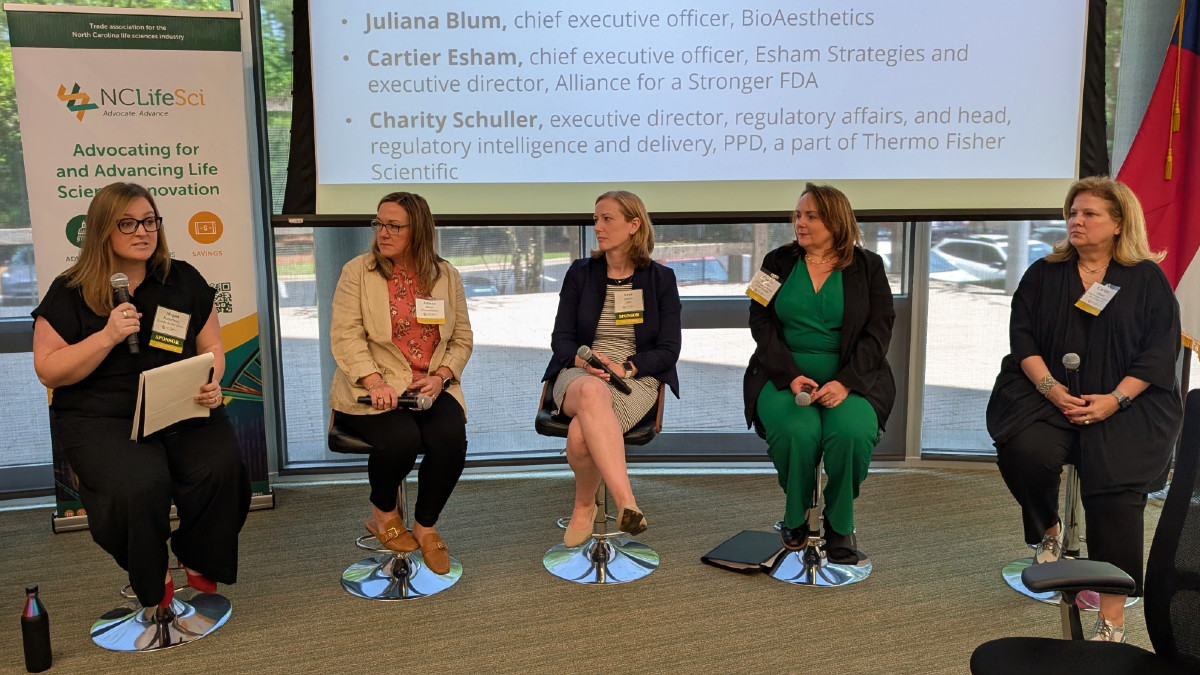Forum explores unprecedented changes at FDA and challenges, opportunities that come with

NCLifeSci members were treated to a candid panel discussion of the rapid-fire changes being made at the Food and Drug Administration and the complex challenges facing the agency in 2025. The event was held May 15 at the NC Biotechnology Center.
Megan Robertson, an attorney at the firm of Epstein Becker Green, served as moderator of a panel comprising
- Anna Abram, senior advisor at Akin,
- Juliana Blum, chief executive officer of BioAesthetics,
- Cartier Esham, CEO of Esham Strategies and executive director of the Alliance for a Stronger FDA, and
- Charity Schuller, executive director, regulatory affairs, and head, regulatory intelligence and delivery, at the PPD clinical research business of Thermo Fisher Scientific.
The event was sponsored by Akin, Benchmark Products, BIO and Epstein Becker Green.
The expert panel described the transformation taking place at the FDA. Abram, a former FDA deputy commissioner, pointed out the unprecedented scale of change.
"At no other point have we been in a moment where so much is actively in motion and changing at the same time," she said.
Workforce Disruption and Communication Challenges
The discussion highlighted significant workforce challenges at the FDA, with panelists noting substantial turnover and uncertainty.
Esham, who leads the Alliance for a Stronger FDA, described the situation as complex, saying that, while most of the changes to the FDA workforce have been made, many employees remain in limbo.
"The commissioner is carefully evaluating which people and functions are critical to bring back," Esham explained.
This uncertainty has created a pressing need for transparent communication, a point made by multiple panelists.
Juliana Blum, CEO of Bio Esthetics, stressed the importance of understanding these changes from a company perspective.
"For small companies, every day is expensive,” she said. “We need to know what the plan is and how to react to the ever-changing environment."
Deregulation: Opportunity or Challenge?
A significant portion of the discussion centered on the current administration's deregulatory approach, particularly the controversial "10 to 1" rule, where for every new regulation introduced, 10 must be rescinded.
"When they say what counts as a regulation, it casts a very broad net, also pulling in guidance,” Abram said. “For every one thing you want to put forward, you've got to identify 10 to pull back."
This approach could potentially affect innovation, with Esham warning about potential risks.
"If you have a weaker regulatory process, you open yourself up to liability,” she said. “The concern is that reviewers might become more risk-averse without clear guideposts."
Global Competitive Landscape
The panel also addressed the growing trend of companies conducting early-stage clinical trials outside the United States. Schuller from the PPD clinical research business of Thermo Fisher Scientific noted this isn't entirely new, highlighting countries like Australia as attractive alternatives.
Esham provided striking statistics.
"Europe's clinical trial starts are up 23%, and China's are up 45% over the last decade," she said.
These numbers underscore a critical concern about maintaining the United States' leadership in medical research and innovation, Esham said.
Practical Strategies for Companies
Despite the challenges, the panelists offered strategic advice for navigating the complex regulatory environment. Key recommendations included:
- Stay focused on core priorities
- Engage with professional organizations
- Tell compelling stories to policymakers
- Remain adaptable
Blum captured the panel's sentiment.
"Change is hard,” she said. “Being complacent is easy, but change also means growth. Focus and influence so that the change is positive."
Abram offered a note of optimism, suggesting that challenging moments often lead to significant improvements.
"Sometimes, out of the most challenging moments for the agency and public health, came the greatest strides of growth in better addressing challenges long-term," she said.
The upcoming Prescription Drug User Fee Act reauthorization in 2027 presents a critical opportunity for stakeholders to shape the future regulatory landscape. The panelists encouraged companies to start preparing their proposals and perspectives now.
Stay Informed
Schuller recommended practical ways for professionals to stay up to date.
"There are numerous podcasts and newsletters you can subscribe to,” she said. “Professional organizations are putting out information constantly."
Esham emphasized the accessibility of advocacy: anyone can do it.
"It's not complicated,” she said. “You don't have to know all the ins and outs. Just be a member of the community explaining your value to policymakers."
